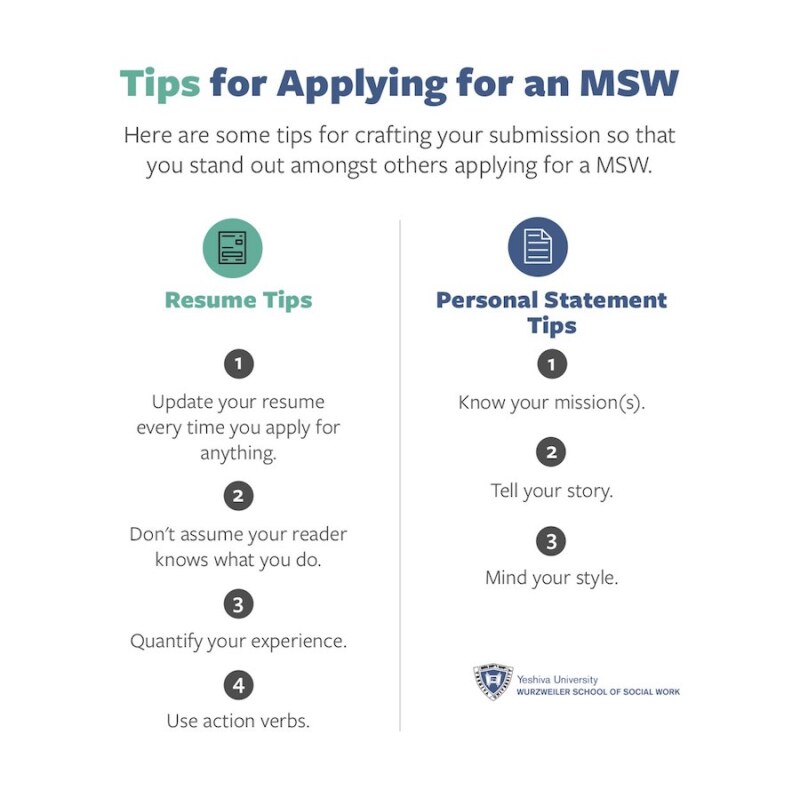
Resume tip #1: Update your resume every time you apply for anything.
When it comes to your resume, one size does not fit all. Even if you're already working in the field, you should consider carefully the program to which you're submitting. Does their program have any specific emphasis, or do they offer any special types of programs? When creating or updating a resume for your MSW application, be sure to emphasize your work accordingly.
Resume tip #2: Don't assume your reader knows what you do.
In a field like social work, there are many paths and many jobs you might pursue. Even though the work you've done up until pursuing your MSW might be totally obvious to you, don't assume that the details of your day-to-day endeavors will be apparent based on your job title alone. Be descriptive. Give some information about the clients you served and the organization you worked for. And don't be afraid to call out your accomplishments—your MSW personal statement is precisely the platform you need to put yourself in the spotlight and let your accomplishments shine
Resume tip #3: Quantify your experience.
Say you have experience working in an after-school program for underprivileged youth in Boston. You could write "Counseled students at an after-school program," and that would be technically accurate. Better? "Counseled 75 students per semester in [Name of Program], an after-school program serving underprivileged youth in Boston." It's important to be detailed, and numbers give a sense of the scope and breadth of your work.
Resume tip #4: Use action verbs.
It is important to be descriptive, but sometimes in resume writing, it's better to use one carefully selected word than an entire paragraph to describe what you did. Here are some key verbs that might help you while you write:
- Accomplished
- Launched
- Supervised
- Counseled
- Achieved
- Published
- Advised
- Budgeted
- Verified
- Built
- Systematized
- Coordinated
- Directed
- Delegated
- Trained
The Personal Statements
In your application to the Wurzweiler School of Social Work, you'll be asked to complete three personal statements. As the name implies, social work as a discipline relies on strong interpersonal communication skills. Your personal statements are a chance for the admissions board to get to know you, and a chance for you to give voice to the experiences that make up your resume.
Personal statement tip #1: Know your mission(s).
Your personal statement, like your resume, should be tailored to the program. Take a look at the curriculum, or if you can, the mission statement of the program to which you are applying. Does it align with your personal mission as a practitioner? If it does, think about how you can best demonstrate the way your personal interests align with the interests of the university.
Personal statement tip #2: Tell your story.
A personal statement should go beyond just describing your experience. This is a place for you to discuss your passion for social work, and what led you to pursue this field. It should demonstrate strong self-awareness of both your strengths and your limitations. Social workers must be consummate communicators, so this is an opportunity for you to show off the skills you've developed as a writer.
Personal statement tip #3: Mind your style.
Maybe you're a better talker than a writer, and that's okay. Still, your personal statement is going to be written and read. Now is not the time to let grammar, spelling, or style slide. When proofreading, consider the following:
- Read your work out loud
- Read it backwards to help you focus at the word level, and not the sentence level
- Don't try to proof every type of mistake at once. Take one pass for spelling, another for punctuation, another for grammar
- Read slowly
- Give your statements to a trusted friend of colleague for feedback. Sometimes two heads are better than one
Get in touch with an Admissions Advisor
As you enter the application process, it's important to have resources and a sounding board. Get in touch with an admissions outreach advisor and get ready to take a big first step toward your world-changing career in social work.
